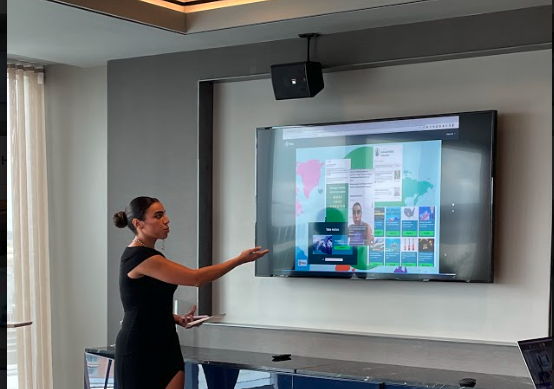I can’t believe that 8 weeks have gone by so fast. In my interview, I said I wanted to be a lawyer after graduation and that I’m looking forward to learning transformable skills that I can take along with me. I didn’t imagine that this would be the internship that completely changes my trajectory. I always knew what I wanted to do in life: graduate college with honors and then go to law school for environmental law. Now I don’t know anymore. I fell in love with the world of public interest communications. I fell in love with the fast-paced work environment, challenging myself every day to learn something new and working with the public for the public. After those eight weeks, I’m reevaluating my plans after graduation and looking forward to exploring this field next summer and in the future. This change is scary. Changing what you thought your career path would look like over the span of only eight weeks. But this is how impactful this opportunity has been for me.
A lot has happened since my last blog. For instance, I worked more on my change makers’ toolkit which is an encompassing resource for the Greenpeace audience to learn more about intersectional environmental justice issues. I wrote blogs on many topics I’m interested in like food apartheid, climate migration, and wildfire racism had the chance to explore them from a communications perspective. During those last few weeks, I continued to explore digital and social tools for Public Interest Communication. For example, I researched, drafted a script, and was the face of a TikTok video that had one of the highest reaches on the Greenpeace platform. I employed those tools to reach the targeted audience and effectively communicated for change. At the end of the TikTok video and each of the blogs I wrote was a call to action for our audience to engage with.
However, if you would ask me about the most important thing I learned this summer, I would say that communications doesn’t have a definition. During the actions camp I attended with Greenpeace, I explored different forms of communication besides digital and social. I grew up in Egypt during the revolution. During a time when the internet was cut by the dictatorship to suppress the voices of the people and cut communication for the world to witness the atrocities done by the government. The people then used art to communicate their frustrations and call for change. Wall art covered the streets all over the country and in them, people not only voiced their demands for change but also communicated plans for peaceful demonstrations. It didn’t click to me before this internship and attending the actions camp, but public interest communication can take place in any medium by claiming and owning space the system takes away from us and our communities. Art, climbing, and blockades are forms of communication as well. Through those, along with social media, communities own space otherwise taken away by repressing systems.
Now, a couple of days out of the fellowship, I’m looking back on those eight weeks and reflecting. Despite being a short amount of time, I grew a lot as an individual and a professional. I had a support system in my cohort and my supervisors and connected with influential people in the community while exploring this new world. Next summer, I’m looking forward to exploring another opportunity in the field of Public Interest Communication. Until then, I will continue to use the skills I learned at Greenpeace and the fellowship to be an effective communicator for change.

